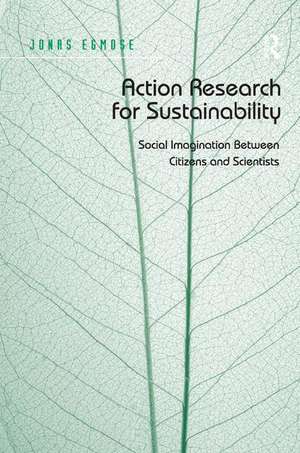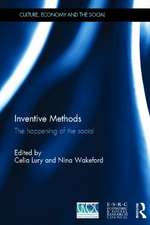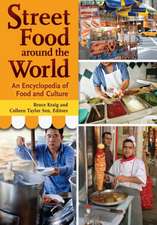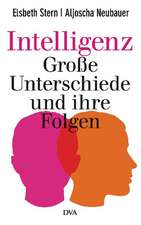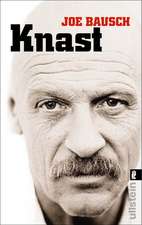Action Research for Sustainability: Social Imagination Between Citizens and Scientists
Autor Jonas Egmoseen Limba Engleză Hardback – 28 ian 2015
| Toate formatele și edițiile | Preț | Express |
|---|---|---|
| Paperback (1) | 382.10 lei 6-8 săpt. | |
| Taylor & Francis – 15 apr 2019 | 382.10 lei 6-8 săpt. | |
| Hardback (1) | 998.71 lei 6-8 săpt. | |
| Taylor & Francis – 28 ian 2015 | 998.71 lei 6-8 săpt. |
Preț: 998.71 lei
Preț vechi: 1217.94 lei
-18% Nou
Puncte Express: 1498
Preț estimativ în valută:
191.12€ • 207.53$ • 160.55£
191.12€ • 207.53$ • 160.55£
Carte tipărită la comandă
Livrare economică 23 aprilie-07 mai
Preluare comenzi: 021 569.72.76
Specificații
ISBN-13: 9781472442826
ISBN-10: 1472442822
Pagini: 152
Ilustrații: Includes 23 b&w illustrations
Dimensiuni: 156 x 234 x 11 mm
Greutate: 0.41 kg
Ediția:Revised edition
Editura: Taylor & Francis
Colecția Routledge
Locul publicării:Oxford, United Kingdom
ISBN-10: 1472442822
Pagini: 152
Ilustrații: Includes 23 b&w illustrations
Dimensiuni: 156 x 234 x 11 mm
Greutate: 0.41 kg
Ediția:Revised edition
Editura: Taylor & Francis
Colecția Routledge
Locul publicării:Oxford, United Kingdom
Notă biografică
Jonas Egmose is Assistant Professor at Roskilde University, Denmark.
Cuprins
Chapter 1 Introduction; Chapter 2 My Research Interest; Chapter 3 Case: Citizen Science for Sustainability; Chapter 4 Methodology; Chapter 5 Democratising Sustainability; Chapter 6 Unfolding Everyday Life Perspectives; Chapter 7 Social Learning between Citizens and Scientists; Chapter 8 Action Research for Sustainability; Chapter 9 Findings and Calls for Action/Research;
Recenzii
’Egmose’s ambitious book links critical utopian action research to sustainability by showing how we can only deal with our survival, the failures of research and policy systems to address it, and the vital role of democratization together. Critical but not pessimistic, Egmose’s vision examines the role of critical reflexivity, multi-disciplinarity, and the people’s voice in addressing this global and local challenge. A truly exciting book.’ Davydd J. Greenwood, Cornell University, USA ’There is growing understanding in both the scientific and broader community discourses that continued inaction will only exacerbate the environmental, social, economic, and political impacts we will face in the future. Egmose provides here a well-supported and richly illustrated examination of this critical question and offers us both theory and practice designed to help us to tackle these issues and, in doing so, to redefine the role of scientists in our societies as partners in creating positive social and environmental change.’ Mary Brydon-Miller, University of Cincinnati, USA (extract from the Foreword) ’This book not only offers an important conceptualization of sustainability that integrates both ecological and social perspectives, but it also provides extremely valuable insights into the creation of free spaces in which citizens, scientists, and practitioner can meet to jointly construct a sustainable future. It is a must read for researchers and practitioners interested in exploring new ways of generating knowledge for change.’ Victor J. Friedman, Max Stern Yezreel Valley College, Israel 'The book is rich with examples and descriptions of happenings in these workshops. ... All in all, this book gives compelling personal and instrumental reasons for researchers to be active participants facilitating and working in the communities they are studying. ... This book is interesting reading for researchers studying social systems, for those desi
Descriere
How can action research further new research orientations towards sustainability? This book, empirically situated in the field of upstream public engagement, involving local residents, researchers and practitioners in bottom-up processes deliberating on urban sustainability, answers this question by analysing processes of social learning. Through analyses of a three year action research programme, aiming to provide local citizens with a greater say in the future of urban sustainability research, this book shows how action research can make important methodological contributions to processes of social learning between citizens and scientists by enabling free spaces in peoples everyday life and within academia, where aspects of un-sustainability can be addressed and new imaginations of more sustainable futures emerge.
